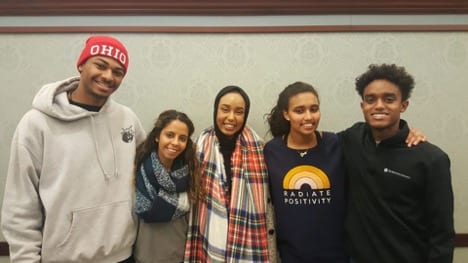The North and South Sudanese Association, an organization aiming to increase awareness about issues regarding Sudan and South Sudan, hosted a meeting Friday to discuss the current unrest in Sudan.
A screening of the documentary “Sudan: History of a Broken Land,” a film that unpacked the complicated history of the two countries, was followed by a discussion about the protests against the government.
NSSA President Mustafa Abubakr addressed the need of having a meeting for Ohio State students, especially those of Sudanese descent.
“We hosted this meeting because the protests started over winter break, when we were all on vacation,” Abubakr said. “We have been posting on our NSSA social media, but a lot of people have been really confused about what is going on and don’t really understand it.”
This meeting was a response to the protests that have been happening for weeks in several cities across Sudan. These protests aim to overthrow the current president, Omar al-Bashir, who has been in power for 30 years.
Roaya Higazi, second-year in city and regional planning major and NSSA outreach and engagement chair, said there are many factors contributing to the start of the protests, including dissatisfaction with Sudan’s inflation rate, the prices of bread, fuel, medicine and gas, and a lack of access to savings.
Higazi said the violent government response to demonstrations has left dozens of protesters dead.
Abubakr said the lack of awareness of the protests stems from the little media attention they are receiving.
“It’s not getting any foreign media coverage. It’s rarely seen on Al Jazeera, maybe something on BBC, but I have not seen anything about it on any American news media,” Abubakr said. “If it is [covered], it is always called the ‘bread protest,’ which really belittles the actual protest.”
People who want to stay informed often have to rely on social media accounts from people in Sudan, Higazi said.
“The type of coverage we want to see is for it to be acknowledged that what’s happening to protesters is a violation of human rights,” Higazi said. “We know people have been protesting but we don’t know what is happening to protesters.”
The lack of coverage creates a space for larger problems to continue, Amna Rustom, a second-year in strategic communication, said.
“There is no higher level of accountability because no one is talking about it. They are violating human rights but no one is talking about it so they can continue to do it without any consequences from any foreign entities,” Rustom said.
Abubakr acknowledged the strengths and setbacks of being a Sudanese American living in the United States at the time of the protests, saying it’s frustrating being in a distant position.
“I know we have the power to do stuff but I still feel powerless because everything we do we feel like it’s not big enough to change the tides of what’s going on over there,” he said.
Still, members of the group are hopeful their efforts will make a difference through the organization and see the traction of social media as a positive sign for the future.
Higazi said social change happens at the university level and many people who have passed away during the protests are college students.
“They’re doing the same things we’re trying to do here,” Higazi said. “Different country but it’s the same mission at the end of the day. It’s important as college students to stand in solidarity with other college students.”



